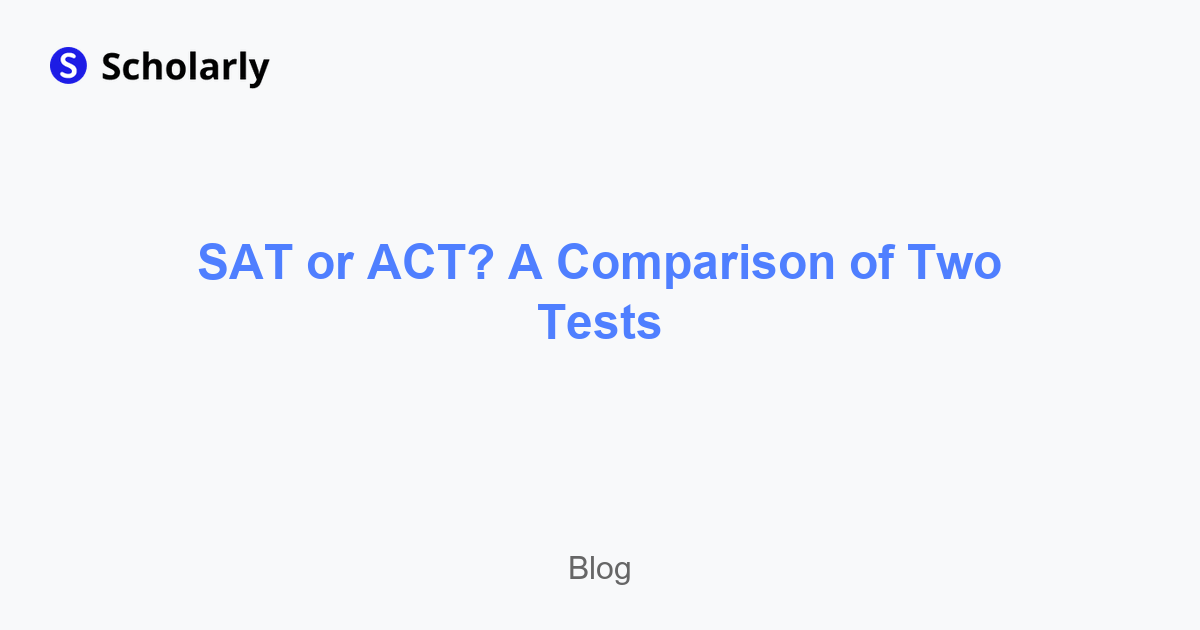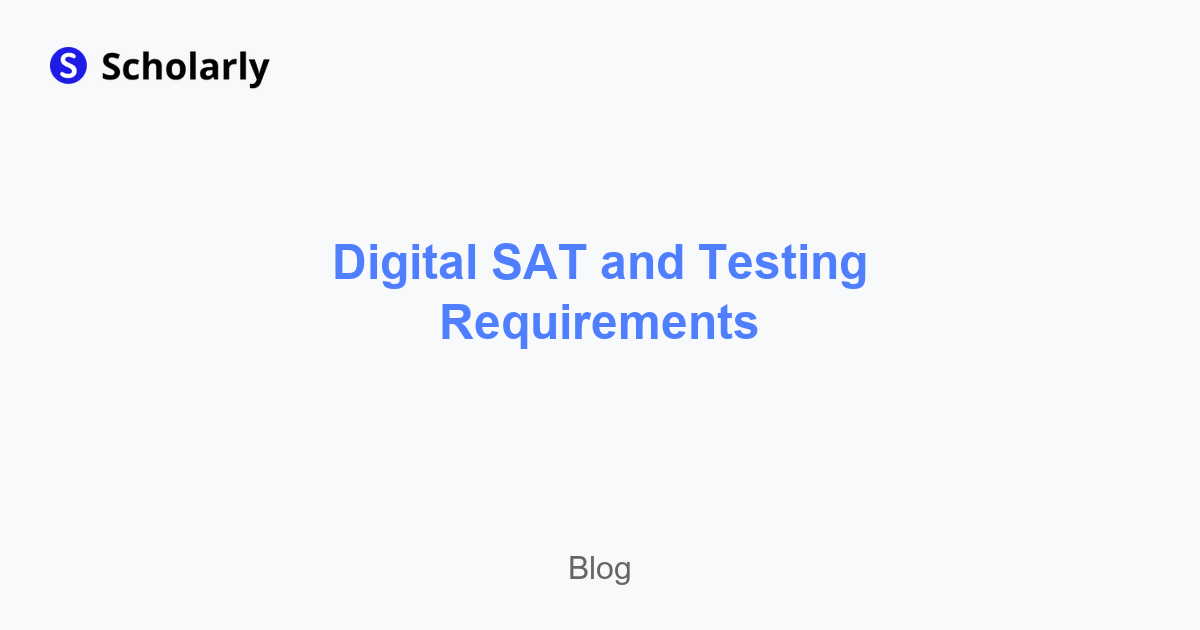SAT or ACT? A Comparison of Two Tests
Can't decide between the SAT and ACT? Here's an honest comparison to help you choose the test that plays to your strengths.

One of the first questions students ask when starting test prep is: "Should I take the SAT or the ACT?"
The answer isn't the same for everyone. While both tests are accepted by all U.S. colleges and universities, they have different formats, pacing, content, and styles. One test might align better with your strengths.
Choosing the right test can mean the difference between a good score and a great score. Here's everything you need to know to make an informed decision.
The Most Important Thing to Know
Every college accepts both tests equally.
Harvard doesn't prefer the SAT. Stanford doesn't prefer the ACT. No selective college has a preference. They truly treat the tests as equivalent.
So this decision isn't about what colleges want. It's about which test you'll perform better on.
SAT vs. ACT: The Basic Facts
SAT
- Score Range: 400-1600
- Sections: Reading and Writing, Math
- Length: 2 hours 14 minutes
- Format: Digital only (as of 2024)
- Science: No separate science section
- Calculator: Allowed throughout entire math section
- Timing: More time per question
ACT
- Score Range: 1-36 (composite)
- Sections: English, Math, Reading, Science (optional Writing)
- Length: 2 hours 55 minutes with Science, 2 hours 15 minutes without
- Format: Digital or paper (student choice as of 2025)
- Science: Separate science section (now optional as of Spring 2025)
- Calculator: Allowed only on math section
- Timing: Faster pacing, less time per question
The Major Differences That Actually Matter
Difference 1: Pacing and Time Pressure
This is one of the biggest differentiators.
SAT: Gives you 41-44% more time per question than the ACT. You have time to read carefully, think through problems, and check your work.
ACT: Moves faster. You need to work quickly and efficiently. There's less time for double-checking or extended problem-solving.
Who this matters for:
Choose the SAT if: You're a careful, methodical worker who likes to fully understand each question before moving on. You tend to be accurate but not necessarily speedy.
Choose the ACT if: You work quickly, make decisions fast, and feel energized by time pressure rather than stressed by it. You don't need to spend a lot of time on each question to get it right.
Difference 2: Reading Passages
The reading sections have fundamentally different structures.
SAT Reading: Features short passages (25-150 words typically) with just one question per passage. You read, answer, and move on.
ACT Reading: Has long passages (about 750 words each) with 9-10 questions per passage. You need to read and comprehend substantial amounts of text, then answer multiple questions about it.
Who this matters for:
Choose the SAT if: You struggle to stay focused on long passages or have difficulty remembering details from lengthy texts. The short passages are easier to manage.
Choose the ACT if: You're a strong reader who can quickly process and retain information from longer passages. You like having multiple questions about the same text.
Difference 3: Math Content and Calculator Use
Both tests cover similar math topics, but with important differences.
SAT Math:
- Calculator allowed throughout the entire math section
- All necessary formulas are provided
- Focuses on algebra, problem-solving, and data analysis
- Minimal geometry and trigonometry
- Digital built-in graphing calculator available
ACT Math:
- Calculator only allowed on the math section (not the science section which may have calculations)
- No formulas provided
- Covers more topics including matrices, logarithms, and trigonometric graphs
- More geometry (about 25-30% of questions)
- You need to know formulas by heart
Who this matters for:
Choose the SAT if: You prefer having access to a calculator throughout and don't want to memorize formulas. You're stronger in algebra than geometry.
Choose the ACT if: You've taken pre-calculus or trigonometry and feel comfortable with advanced math concepts. You know your formulas cold and can work without them being provided.
Difference 4: Science Reasoning
This is a major structural difference.
SAT: No separate science section. Science concepts appear in reading passages and some math word problems, but there's no dedicated science section.
ACT: Has a science section (though it's now optional as of Spring 2025). It tests scientific reasoning, data interpretation, and analysis of experiments, but not specific science knowledge.
Who this matters for:
Choose the SAT if: You find the idea of a science section stressful, or you haven't taken much science coursework yet.
Choose the ACT if: You enjoy reading graphs, analyzing data, and thinking scientifically. You're comfortable with the format of science experiments and data interpretation.
Important note: Some colleges may still want to see the ACT Science score even though it's optional now. Check with your target schools.
Difference 5: Test Format and Adaptive Features
SAT: Fully digital everywhere. Features adaptive testing, meaning the second module of each section adjusts difficulty based on how you perform on the first module. Better first-module performance leads to harder second-module questions worth more points.
ACT: Offers both digital and paper formats (student choice). The test is linear, not adaptive, meaning every student sees the same difficulty regardless of performance.
Who this matters for:
Choose the SAT if: You're comfortable with digital testing and like that performing well early can lead to higher-value questions.
Choose the ACT if: You prefer the consistency of paper testing or want to know that one section's performance doesn't affect the next.
Difference 6: Question Style
SAT: Tends to have longer, more complex word problems. Questions often test whether you can apply concepts to novel situations. More "puzzle-like" in nature.
ACT: Questions tend to be more straightforward. They test whether you know the content and can apply it efficiently. More "content knowledge" focused.
Who this matters for:
Choose the SAT if: You enjoy creative problem-solving and thinking through complex scenarios. You're good at figuring out what a question is really asking.
Choose the ACT if: You prefer straightforward questions where you identify the concept being tested and apply your knowledge directly.
How to Decide Which Test to Take
Strategy 1: Take a Practice Test of Each
This is the single best way to figure out which test suits you.
How to do this:
- Download an official SAT practice test from College Board
- Download an official ACT practice test from ACT.org
- Take both under realistic testing conditions (timed, minimal distractions)
- Score both tests
- Convert your scores to compare them (use official concordance tables)
What to notice:
- Which test felt more natural?
- Which test did you score higher on?
- Which test's pacing felt more comfortable?
- Which test's question styles suited your thinking style?
If you score significantly better on one test (more than 50-70 SAT points or 2-3 ACT points difference), that's probably your test.
Strategy 2: Consider Your Strengths and Weaknesses
You might prefer the SAT if you:
- Read carefully but not super quickly
- Like having time to think through problems
- Are stronger in algebra than geometry
- Prefer shorter reading passages
- Like having formulas provided
- Work well with digital interfaces
You might prefer the ACT if you:
- Work quickly and efficiently
- Can process long passages effectively
- Have taken advanced math (pre-calc or beyond)
- Enjoy science and data analysis
- Know your math formulas by heart
- Like straightforward, content-based questions
Strategy 3: Consider Your Course Background
SAT tends to be better for students who:
- Haven't taken advanced math courses yet
- Are strong in algebra and basic geometry
- Have solid reading comprehension skills
ACT tends to be better for students who:
- Have completed pre-calculus or trigonometry
- Have taken multiple science courses (biology, chemistry, physics)
- Are quick readers with good retention
Strategy 4: Think About Test Availability and Timing
SAT:
- Offered 7 times per year (August, September, October, November, December, March, May, June)
- School day tests also available
ACT:
- Offered 7 times per year (September, October, December, February, April, June, July)
- School day tests also available
Both tests are widely available, so this usually isn't a major factor, but check which test centers are more convenient for you.
Can You Take Both?
Yes, and many students do.
Reasons to take both:
- You scored similarly on practice tests and want to see which you perform better on in actual testing
- You want to maximize your chances of getting your best possible score
- Different schools you're applying to might superscore differently
Reasons to focus on one:
- You scored significantly better on one in practice tests
- You want to focus your prep time on mastering one test
- Testing fees add up if you're taking multiple sittings
Smart approach: Take one official sitting of each, see which score is better, then focus your remaining prep and test sittings on that one.
How the 2025 Changes Affect Your Decision
SAT Changes (Already Implemented)
- Fully digital format
- Shorter test (2 hours 14 minutes)
- Adaptive sections
- Shorter reading passages
These changes generally made the SAT less intimidating and faster-paced than before.
ACT Changes (New for 2025)
- Science section is now optional
- Digital format is available (paper still an option)
- Multiple test format options
These changes make the ACT more flexible, but potentially more confusing. Check whether your target schools want to see the Science score.
What If You're Test-Optional?
Many colleges are test-optional now, meaning you can apply without submitting test scores.
Should you still take the SAT or ACT?
Consider testing if:
- A strong test score could strengthen your application
- You're applying to competitive scholarships that require scores
- Your GPA doesn't fully reflect your academic ability
- You're confident you can score well
Consider going test-optional if:
- Your GPA and coursework are very strong
- Practice tests show you're unlikely to score competitively
- Test anxiety significantly affects your performance
- The schools you're applying to truly treat test-optional applications equally
Prep Resources for Each Test
SAT Prep
- Khan Academy (free, official partnership with College Board)
- College Board's Bluebook app (official practice tests)
- Official SAT Study Guide
- Commercial prep courses (Kaplan, Princeton Review, etc.)
ACT Prep
- ACT Academy (free, official prep)
- Official ACT Prep Guide
- Commercial prep courses (Kaplan, Princeton Review, etc.)
For both tests: Consider working with Scholarly to create AI-powered flashcards from your prep materials to retain formulas, concepts, and strategies.
Common Myths About SAT vs. ACT
Myth: "The ACT is easier than the SAT." Reality: Neither test is inherently easier. They test similar content in different ways.
Myth: "East Coast schools prefer the SAT." Reality: All schools accept both tests equally, regardless of region.
Myth: "The ACT is better for science-minded students." Reality: The ACT Science section doesn't test science knowledge, it tests data interpretation.
Myth: "You should take both tests to maximize your chances." Reality: It's better to focus on one test and master it rather than splitting your prep time.
Myth: "The SAT has harder math." Reality: The SAT math may seem harder because of word problems, but the ACT covers more advanced topics.
The Bottom Line
The best test for you is the one you score highest on.
Here's your action plan:
- Take a full-length practice test of both the SAT and ACT under realistic conditions
- Score both tests and compare using official concordance tables
- Reflect on which test felt more natural in terms of pacing, question style, and format
- Choose the test where you scored better and felt more comfortable
- Focus your prep on that test to maximize your score
Both tests are accepted everywhere. Both tests measure college readiness. Both tests can help you get into great schools.
The question isn't which test is better overall. It's which test is better for you specifically.
Ready to Master Your Test Prep?
Once you've chosen your test, make sure you're actually retaining what you study.
Scholarly helps you turn SAT or ACT prep materials into AI-powered flashcards that help you remember formulas, strategies, and content.
Choose your test. Prep smart. Score high.
Try Our Popular AI Study Tools
Transform your study materials into interactive learning experiences with our most popular AI-powered tools:
PDF to Flashcards
Convert lecture notes and textbooks into study flashcards instantly
Text to Flashcards
Turn any text or notes into comprehensive flashcard sets
Image to Flashcards
Convert diagrams and handwritten notes into digital flashcards
YouTube to Flashcards
Generate flashcards from educational video content

